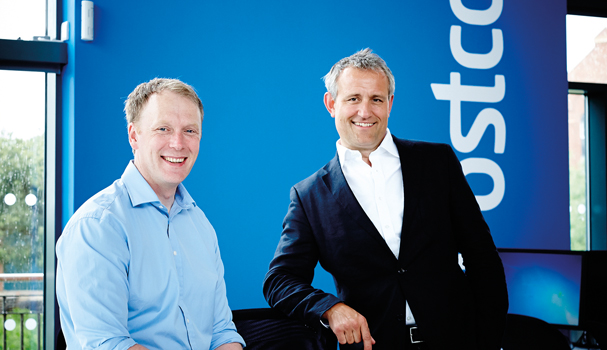In May 2000, Guy Mucklow walked into his father’s office and resigned from his job at the investment property business his grandfather had founded in 1933. He, like so many other entrepreneurial types, felt that dotcom businesses were the future and he wanted to be a part of it. “I wanted to establish a company that would grow fast and make a real contribution to the economy,” he says. “The internet was taking off, we were all getting excited and I saw an opportunity.”
That opportunity was pubs’ inefficient supply chains; the result was pubowner.com. And, if the dotcom bubble hadn’t burst within weeks of Mucklow and his business partner Andrew Younger setting up shop, this might be the story of that company.
Instead, it’s about what happened after Mucklow realised that the business model was “fatally flawed” and pulled the plug at the start of 2001. “We were aiming for too narrow a market with a proposition that had very limited appeal. More importantly we were also far too early in the market cycle, a lesson that many start-up technology companies perhaps fail to appreciate until it’s too late.”
He parted ways with Younger, who had been pubowner.com’s CEO, and set up a new partnership with software developer Jamie Turner, who had been its technical chief. The new idea was to combine some of the software they’d developed for pubowner.com with the Royal Mail’s database to change the way companies entered customers’ addresses into their own systems.
Up until this point the options were fairly labour intensive. Companies could simply enter them manually, which took time and created all sorts of opportunities for errors, particularly with the growth of off-shore call centres operated by people unfamiliar with UK addresses. Or, if they were a bit more high-tech, they could buy the Royal Mail’s address database, import the information into their own systems and use this to make sure that it was entered properly. This in turn means their own customer data can be analysed more effectively using big data techniques.
Though when we say hi-tech, it still sounds charmingly manual by modern standards; updates would be sent monthly via CD and required IT staff to make sure that the new information was installed correctly.
Mucklow and Turner’s business, Postcode Anywhere, obviates the need for physical deliveries by turning the whole process into software-as-a-service (SAAS). Its clients do not need to store the information on their own computers or update it themselves. Instead, they license technology that allows them to access the information from Postcode Anywhere’s central servers, where it can be constantly updated.

Guy Mucklow – Postcode Anywhere
The product itself is not complex, says Turner. Chances are any reader who has used an e-commerce site will be familiar with how it works: enter your postcode, select your street address from the drop down menu and you’re done. No risk there of a postcode typo sending your order to Manchester instead of Milton Keynes or Birmingham instead of Bristol.
“The complexity comes from making it work all the time – when you are updating, when there is a power cut, when there is a fire,” says Turner. Originally, all the company’s servers were in its little office but about ten years ago they moved to a proper off-site data centre in south Birmingham, reasoning that it would be more secure and reliable. Two weeks later, however, the company started getting calls from clients who weren’t able to make the service work.
It turned out that some youngsters who were preparing to break into the cricket club across the street to raid its bar had lifted a manhole cover and cut what they thought were security cables but which turned out to be the data centre’s connection to the outside world. “They had watched too many Hollywood movies,” says Turner, who eventually managed to bodge together a temporary fix with an old PC and an ADSL line.
Today, the technology is far more robust – it has to be able to handle the five to ten million address requests it handles every day. “Every time someone buys something online in the UK there is a 60% chance that it is through our platform,” says Mucklow, who turned over just over £8m last year and is forecasting £10m this year. It’s also expanding internationally, with deals in Canada and Australia and others in the pipeline.
While revenue and profit margins – consistently around 32% before tax, says Mucklow – are solid today, it took four years for the business to make a profit. Simply securing their first client was reason for celebration, says Turner, who gives his “really gossipy mum” some of the credit. She chatted to someone whose child’s company turned out to be doing a website for the Passport Agency; this led to a suggestion that Postcode Anywhere pitch its services and, ultimately, their first deal.
“In the first few years, everyone assumes that you are a charlatan out to steal their money, which is really demoralising,” says Turner. “But as soon as we could say ‘Her Majesty’s government is using it and we can show you where’, it’s okay. From there, the company started to build.”

Jamie Turner – Postcode Anywhere
E-commerce has proved to be its strongest market, with clients very interested in the SAAS model. QAS, owned by Experian, is still dominant in call centres, which Turner says are more likely to be tied to older legacy systems that make switching more difficult. In fact, one of Postcode Anywhere’s differentiators is that it doesn’t lock people into long contracts, which Turner says is popular with customers and “good discipline” for the company. “People don’t want to commit… and they don’t want to be sold to. If you have a good product that people want to buy, that’s a far more pleasant place to be.”
The key to making this work is creating a self-service environment with totally transparent pricing. When they started out it was difficult to find out how much their competitors were charging, says Mucklow, who thinks they were probably working out a number based on how much sales people thought that customers could pay. “You can’t do that with the internet,” he says.
One of Postcode Anywhere’s pricing options operates rather like a pay-as-you-go mobile phone deal, with customers buying a credit pack that suits them – 300 address look-ups costs £25 – and receiving an automatic top-up reminder when their balance drops to a certain point. Mucklow also built in scalability from the start in the form of automated invoicing, as selling a high-volume, low-value product means that profits depend on everything happening as smoothly and simply as possible. “So we do 20,000 invoices per year but we only have one person working on credit control for 2.5 days per week. It’s as simple as that. It’s about thinking ahead.”
Thinking ahead includes imagining a day when address verification is no longer a growing market. “What we have to be really mindful of is that there are different ways for people to enter addresses, including using autocomplete or logging in via Facebook, so the market for address entry will level off and go into longer term decline,” says Turner. “That’s the way of these things. So our third big stream of medium- to long-term planning is looking at the technology we have built inside the company.”
The result is a big-data application called Triggar – the odd spelling is not an error but a domain-name necessity – that analyses customers’ interactions with a company to see how they feel about the relationship. Businesses can then use this knowledge to determine who will see a marketing email as an irritating piece of spam and who will welcome it as useful information, for example. Trials of the product begin in September, with Turner expecting to take it to market at the start of 2015.
Fifteen years after stepping away from his 31 family business, Mucklow is confident that he is making the impact that he had in mind when he left. “We have invested a couple of million in new offices that will accommodate double our current headcount of 50, and we have a plan to reach £50m turnover in five years,” he says. “And Jamie and I are in the process of releasing 5% of our equity – we have 98% – for a scheme so that everyone in the company benefits. If we hit all our targets that will rise to 10%.” ![]()
Share via:








































